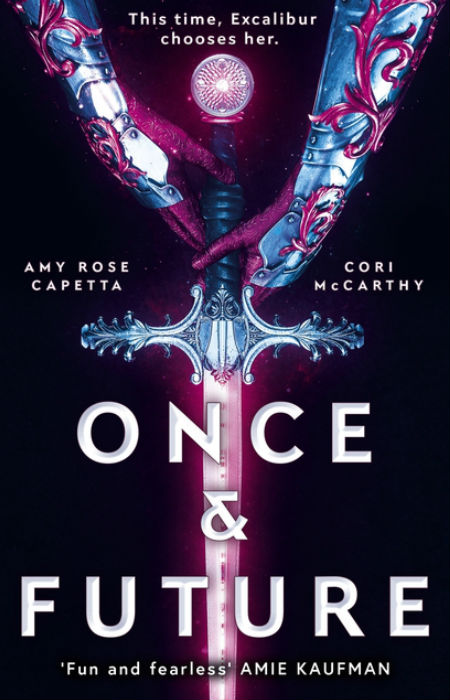
One thing that quickly becomes apparent when you plunge into the vividly imaginative postmodern queer sci-fi storytelling of Once & Future by Amy Rose Capetta and Cori McCarthy, is that this is not your grandmother’s retelling of the Arthurian legend.
To be fair, most grandmothers probably do not habitually sit around spinning yarns about King Arthur, who may or may not have existed but sadly likely didn’t, Morgana, Mordered and the hallowed Knights of the Round Table, but if they were or are so inclined, you would likely find a great deal about this spirited tale that differs from the usual stories of a king who was celebrated for uniting Britons against a common enemy, 5th Century Saxon invaders.
That’s partly because there is no one canonical recounting of the Arthurian legend but mostly because Capetta and McCarthy, partners in writing and in life, have gone to town on a richly reimagined of one of Britian’s most beloved heroes, refashioning him as a hero for our occasionally more progressive age.
For a start, Arthur is now Ari, the very female survivor of the purging of the planet of Ketch by the rapacious authoritarian corporate entity that ruthlessly rules the galaxy, Mercer, upon whom all life precariously depends.
Rendered an orphan by a pretty tragic turn of events, Ari rather magically manages to attract the attention of a small space-faring family made up of her eventual brother Kay and his two moms, Captain Mom and Mom, as they’re passing the spaceship wreckage in which she’s trapped.
Quite how she made her presence known has always seemed damn near miraculous to all concerned but when a rather youthful, near beardless and hormone-crazy Merlin turns up and announces that Ari is the 42nd reincarnation of Arthur and the one who must save humanity, now spread rather messily across three galaxies form itself, it all begins to make more sense.
“If things truly got better, Morgana couldn’t have given him a head full of the terrible happenings since the last Arthur. His brain served them up in king-size portions. Rampant fire. Choking floods. Clouds that smeared the sky with toxins. People trampling over each other to leave Earth, and then scattering so far and wide they could no longer help each other without a company like Mercer sliding in to fill the void.
This was why people needed Arthur.” (P. 136)
Or rather, doesn’t.
At least at first when Ari, Kay and an ever growng band of anti-Mercer rebels including reincarnations of Lancelot (Jordan), Gweniviere (Gwen), Percival (Val) and Lamarack (Lam) have to process a lot of revelations from Merlin who is both determined to get his 42nd cycle of trying to inspire Arthur to be the hero humanity supposedly needs and weary of the fact that this is happening all over again.
His will to win out comes out on top because Merlin is a good and decent guy – or is he? In some nuanced and deftly-layered characterisation that draws off classic Arthurian storytelling, Merlin is as fallible and flawed as the rest of us – well, at least now he is, and wants to do the right thing for everyone else as well end his eternal struggle to help Arthur fulfill his destiny.
If you can imagine how you would react to fantastical news such as this that touches on all the hero tropes and cliches you have habitually laughed at all your life, then you have some idea of the mischievous flavour that runs winningly through the effervescent, action-filled joy that is Once & Future.

As re-imaginings go, the novel is an unmitigated joy to read.
Especially if, like me, a gay man who rarely sees himself or the world of which he is now blessedly a part after summoning up the courage years ago to own who he is and come out, you have been crying out for literature that celebrates difference as something blessedly, wonderfully, exuberantly normal.
Once and Future is packed to its medieval sci-fi rafters – this is now a genre that is set to continue with the sequel to this rapturously good tale in The Sword in the Stars, due in 2020 – with characters who defy all kinds of archaic ideas about gender, race and sexuality as they swashbuckle their way through ye old timey planets like Lionel, mega city monstrosities like Troy, desert planets (with dragons!) like Ketch and a prison planet made of ice and awash in plague.
There are also some characters, rather interestingly for a big epic tale about fighting tyranny and unifying humanity, who aren’t all that thrilled about any kind of one-size-fits-all model for the human race.
Written by authors who definitely and unapologetically inhabit a distinctly queer space, Once & Future is a novel that celebrates ideas of freedom and anti-authoritarianism while also being quite clear about the fact humanity has a rather nasty habit of hating on difference and trying to shove all kinds of diverse square pegs into ill-fitting round holes.
“‘Oh, Merlin, uniting humankind under one banner?’ She [Nin] tutted like a grandmother , even though she looked eternally twenty-five. ‘That sounds like imperialism, doesn’t it? The sun never sets on the Arthurian empire? Do you remember how many problems that impulse caused in the past? What about the future? Doesn’t this Mercer Company want to unite everyone, too? How can any single entity know what’s best for all people? These humans keep making the same boring mistake of demonizing differencwe, but believe me, if unity for all worked, I would have gotten into the deity game a long time ago'” (P. 300)
It may seem like a tricky road to walk, especially for a novel replete with galaxy-spanning adventure upon which the fate of humanity rests, but it totally works, predicated on the idea that while freedom and unity are good things, they can also become suffocating prisons if burdened with tightly-defined narrow ideas of what constitutes acceptable expressions of humanity.
Thus in Once & Future, we have freedom fighters, all of whom come across as beautifully wrought, emotionally-evocative and massively funny characters with whom you can readily identify, who identify as gay, lesbian, straight, gender-fluid and diverse and who eschew ideas for race, gender and sexuality to which humanity has rather mistakenly clung to for eons.
Just as a newly-awoken Merlin has to struggle with a universe he barely recognises – to get some idea of what a stretch this is for him, keep in mind he wakes up to a denuded, deserted Earth, bereft of humanity, a grossly-exploited mausoleum to the fatally-damaging consequences of humanity’s worse excesses – so do all these people, whom you will grow to know and love with a passion that may surprise you, have to struggle with fighting for an end to tyranny while desperately trying to avoid another one of a different stripe being inserted in its place.
Humanity is lamentably far too good at doing that to its own great, ongoing detriment.
The great refreshing thrill of Once & Future is that in the middle of racing with gusto and thoughtfulness through the galaxy, in the process giving us an adventure that seizes the mind and captures the heart, it also stops to wonder what kind of “after” will follow the soon-to-fall “before”, reasoning that for this victory to truly mean anything it must include all the multitudinous diversity and rich diversity of all people, lest we end up repeating the same mistake all over again (just like Merlin), one from which we may, it is clear, never recover.